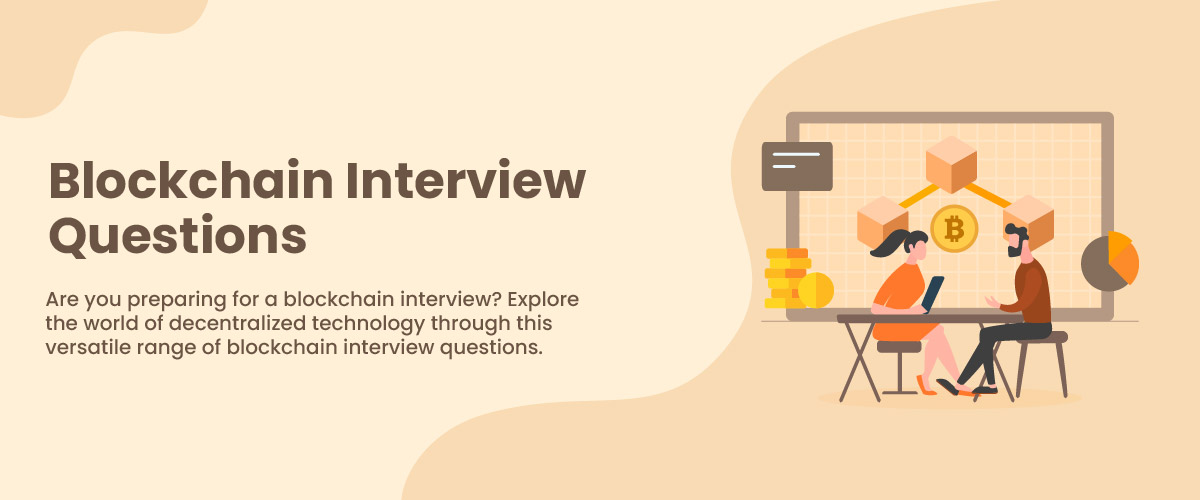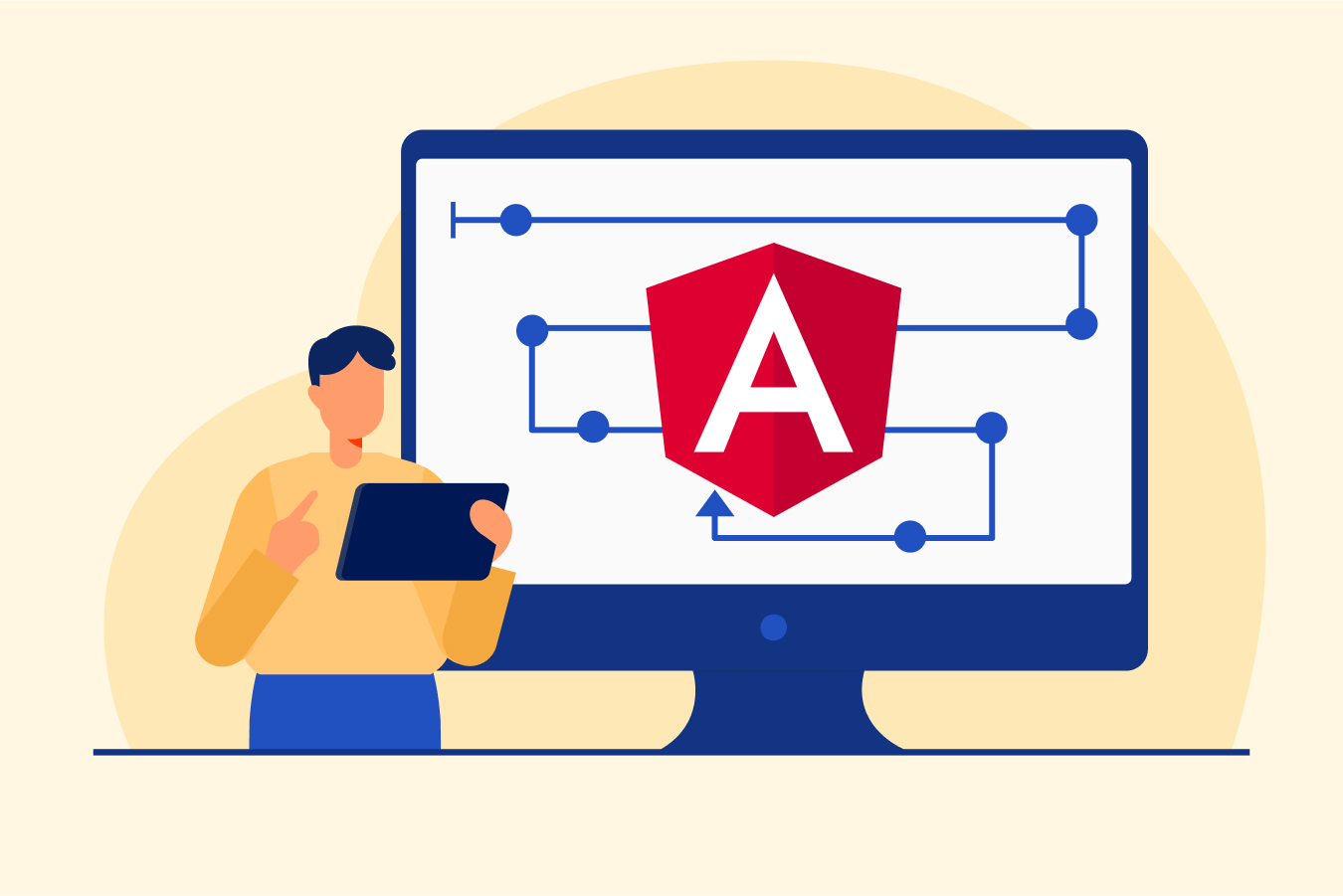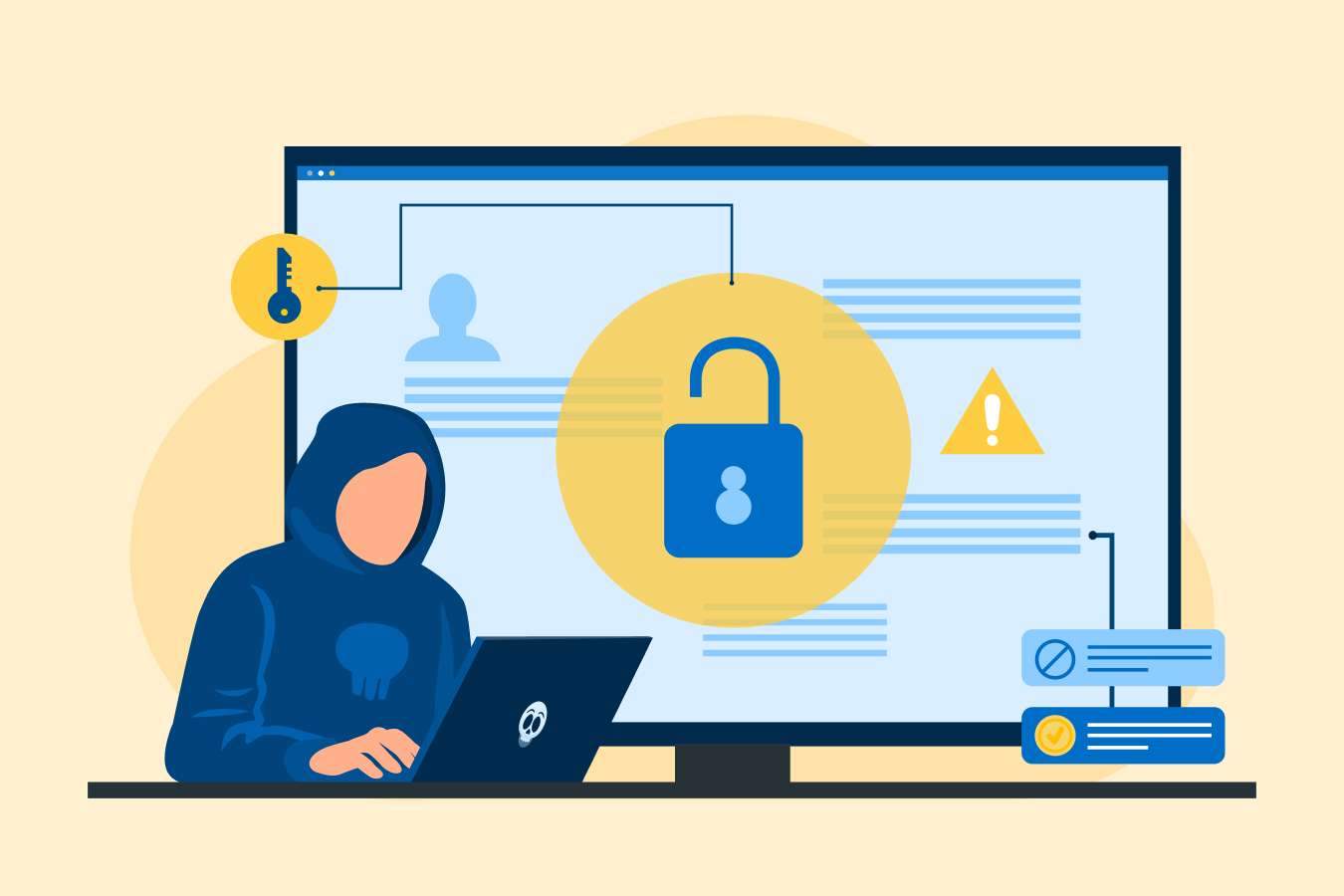Blockchain Interview Questions and Answers
Blockchain is a digital ledger technology used to record transactions securely. It maintains a continuously growing list of records called blocks. These blocks are linked and secured using cryptography. They are used in applications where secure and transparent record-keeping is required, like supply chain management, voting systems, and digital identity verification.
The secure nature of the blockchain makes it difficult to hack or manipulate, making it a reliable technology for a wide range of applications. To get through the blockchain interview questions, one must have a basic knowledge of the subject.
Basic Blockchain Interview Questions and Answers
To get a general idea of blockchain interview questions, let us go through some basic questions asked during the interview.
1. What is Blockchain?
Blockchain is a decentralized distributed database of immutable records used to record transactions securely.
2. State the principle on which blockchain technology is based.
It is based on the principle that the information is distributed among the users without being copied.
3. Name the different types of blockchains.
There are three types of blockchains:
- Public
- Private
- Consortium
4. What makes Blockchain a trusted approach?
Blockchain is a trusted source because of various reasons, like:
- It is compatible with businesses as it has an open-source nature.
- It is secure and specifically meant for online transactions.
- It can be considered for any business.
5. What are the two types of records present in blockchain databases?
Block records and transactional records.
6. Name the properties of Blockchain.
There are four properties of Blockchain:
- Decentralized Systems
- Secure Ecosystem
- Distributed Ledger
- Minting
7. Explain Encryption and its role in Blockchain.
An approach that helps organizations to keep their data secure is known as Encryption. The data is encoded to some extent before sending it out, and only authorized parties have access to it. It is helpful in blockchain as it adds more security and keeps the data safe.
8. Define blocks in the blockchain.
Blockchain has a list of records, and these records are stored in blocks. These blocks are linked to other blocks and constitute a chain called a blockchain.
9. Explain block identifiers.
Block Identifiers are used to identify blocks in the blockchain. They can be identified by the block header hash and the block height.
10. What type of ledger is blockchain?
Blockchain is considered an incorruptible ledger.
11. What are the types of ledger that blockchain users can consider?
The following are the types of ledger in the blockchain:
- Centralized network
- Decentralized network
- Distributed network
12. Differentiate between blockchain and traditional databases.
| Blockchain | Traditional Database |
| It only inserts operations. | It can perform C.R.U.D. operations. |
| It fully replicates the block on every peer. | It replicates in multi-master. |
| In a blockchain, major peers agree on the outcome of transactions. | It has distributed transactions. |
| It allows anyone to validate transactions. | It follows integrity constraints. |
Intermediate Level Blockchain Interview Questions and Answers
The following is a set of detailed blockchain interview questions and answers for freshers that are commonly asked during an interview:
13. What is the difference between blockchain and hyper ledger?
Blockchain is a digital ledger technology used to record transactions securely. It can be used in fields like business, healthcare, and government. Hyperledger is a platform that allows people to build a private blockchain. It is used for enterprise-based solutions.
14. Explain Merkel Tree.
A data structure used for verifying a block is known as a Merkel Tree. It is structured like a binary tree, in which each leaf node is a hash of a block of transactional data, and each non-leaf node is a hash of its leaf node.
15. How is a block identified?
The block consists of fields that make it recognizable. It includes:
- The hash value of the previous block.
- The details of several transactional data.
- The random value is used to vary the value of the hash.
- The fourth field is the hash of the block.
16. Explain Cryptography and its role in Blockchain.
Cryptography is the process of encrypting and decrypting data with public and private keys. It is used in blockchain to identify users and ensure safe transactions.
17. xplain a Genesis Block.
The first block in the blockchain, also referred to as block 0, is known as the Genesis block. It defines parameters like levels of difficulty and consensus mechanism. It is the only block that does not refer to its previous block.
18. Explain what happens when a file is deployed with multiple contracts.
The compiler only deploys the last contract from the uploaded file in the blockchain. Hence, deploying with multiple contracts is not possible.
19. Explain the working of blockchain.
The following steps explain the working of the blockchain:
- It works on a network of nodes and is used to validate transactions.
- They are recorded in a block linked to the previous block.
- It forms a chain of blocks called a blockchain.
20. State the benefits of using blockchain technology.
Blockchain technology is useful for a wide range of applications. It offers benefits like transparency, increased security, efficiency, and immutability of data.
21. Define smart contract.
A self-executing contract programmed with predefined conditions that are automatically executed by two or more parties is known as a smart contract.
22. Explain the role of miners in blockchain technology.
They are responsible for verifying the transactions on the blockchain network. In return, they are rewarded with cryptocurrency.
23. How is blockchain used in industries like healthcare and finance?
It is used in finance to facilitate more secure, faster, and cost-effective transactions. While in healthcare, it is used to share and store patient data securely.
24. some potential challenges of using blockchain technology.
Interoperability, scalability, regulatory compliance, and privacy concerns are potential challenges of using blockchain technology.
Advanced Level Blockchain Interview Questions and Answers
Python is often used for blockchain development. You can learn more about it by taking an in-depth Python course. Following are the blockchain interview questions for intermediate candidates preparing for an interview:
25. What are some cryptographic algorithms used in blockchain technology?
The following are some cryptographic algorithms used in blockchain technology:
- SHA-256
- RSA
- Triple DES
- Ethash
- Blowfish
26. How is a Block signature generated?
The following steps are followed to generate a Block signature:
- A node receives a new block and verifies the signature using the public key.
- It ensures the integrity of the block and prevents tampering.
- The encrypted hash generated following these steps is known as a block signature.
27. List the applications of smart contracts.
The following are applications of smart contracts:
- Transport: Shipment can be tracked easily with the help of smart contracts.
- Protection of Copyright: It can protect ownership rights.
- Contract of Employment: It helps facilitate wage payments.
- Insurance: It prevents false claims and prevents forgeries.
28. Explain Dapp.
A decentralized application deployed using smart contracts is known as Dapp. It has back-end code that runs on a decentralized peer-to-peer network.
29. What are the leading source platforms for developing blockchain applications?
The following are the leading source platforms for developing blockchain applications:
- Ethereum
- Eris
- Hyperledger
- Multichain
- Open chain
30. What is the first thing the user should specify in a Solidity file?
The user must specify the version number of Solidity at the beginning of the code, as it eliminates errors. It is a mandatory requirement that has to be on top of any solidity code.
31. Define Ethereum.
Ethereum is a blockchain-based computing platform that features smart contract functionality. It enables users to deploy their decentralized applications.
32. Explain the types of Ethereum networks.
There are three types of networks in Ethereum:
- Live Network: This is also known as the main network and is used to deploy smart contracts.
- Test Network: It allows the user to run their smart network before it is deployed on the main network.
- Private Network: It runs within the premises of the organization and is connected to the main network.
Professional Level Blockchain Interview Questions and Answers
Now that we have covered the two major categories, let us go through the questions commonly asked by candidates that have experience in the field. Following are the blockchain interview questions for experienced candidates:
33. What are the steps involved in blockchain project implementation?
The blockchain project implementation follows the following four steps:
- Identification: In this step, the problem, along with the most suitable consensus mechanism and the platform, is identified.
- Planning: An individual decides on a suitable blockchain platform and evaluates all requirements in this stage.
- Development: In this step, the architecture and user interface are designed, and the APIs are built.
- Monitoring: The final step constitutes applying proof of concept and fixing errors, if any.
34. List the parts of EVM memory.
The following are the parts of EVM memory:
- Storage
- Memory
- Stack
35. Define Fork. What are its types?
Fork is used to update a cryptocurrency protocol or code. It ensures that the blockchain splits up into two branches. The following are the three types of fork:
- Hard forks
- Soft forks
- Accidental forks
36. Differentiate between PoW and PoS.
| Differences | PoW | PoS |
| Resource Requirement | It requires significant resources that consume high energy. | It holds a certain amount of native cryptocurrency of the network, known as stake. |
| Validation Process | The validation process is slow and expensive. | The validation process is based on the amount of stake held by the participant. |
| Security | This system is considered more secure. | This system is more vulnerable to attacks. |
| Decentralization | It requires significantly more amount of computing power. | It is designed to be more inclusive. |
37. Explain the difference between a private blockchain and a public blockchain.
A centralized blockchain network accessible to a select group of participants, like a specific organization, is known as a private blockchain. A blockchain that is open to use for anyone and follows a decentralized consensus mechanism to validate the transactions is known as a public blockchain.
38. Explain 51% attack.
It is an attack referring to a vulnerability where an individual or group of people control the majority of the mining power. It allows the attackers to prevent new transactions from being confirmed.
39. Define the Consensus mechanism.
It is a method used by blockchain networks to verify and validate transactions. It varies between different blockchain networks. It works towards a mutual goal to create a ledger secure from manipulations or attacks.
40. What are the function modifiers in Solidity used for?
Function modifiers in Solidity are used to modify the behavior of your smart contract functions. They can build additional features or apply restrictions on the function of smart contracts.
Commonly Asked Blockchain Developer Interview Questions
The following blockchain developer interview questions can be asked of the candidate during an interview:
41. How to design and develop a decentralized application on a blockchain network?
42. What are some challenges faced in blockchain development?
43. How to handle scalability issues in a blockchain network?
44. How to ensure the interoperability of different blockchain networks?
45. How to stay updated with the latest advancements in blockchain technology?
46. Explain the purpose of the blockchain node.
47. Explain the work of nodes.
48. Explain why is the blockchain immutable.
49. Explain stealth address.
50. Explain off-chain transactions.
Conclusion
With the blockchain interview questions answered above, candidates will be able to sail through the interview and land themselves the job that they desire. It covers topics from a basic understanding of blockchain to an advanced level of questions asked frequently during an interview.






